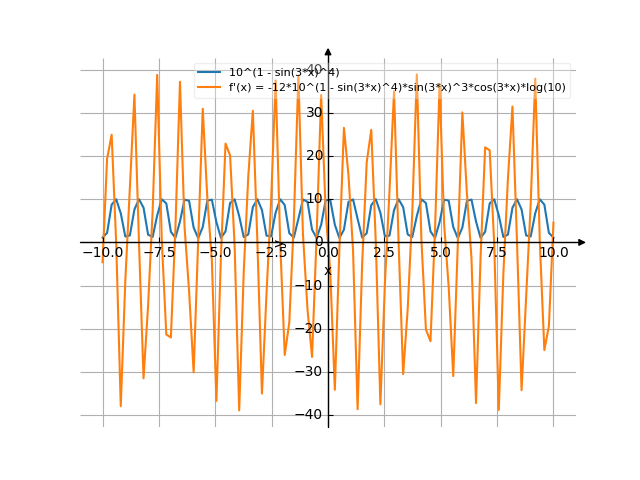Derivative of 10^(1-sin(3*x)^(4))
The solution
You have entered
[src]
4 1 - sin (3*x) 10
$$10^{1 - \sin^{4}{\left(3 x \right)}}$$
/ 4 \ d | 1 - sin (3*x)| --\10 / dx
$$\frac{d}{d x} 10^{1 - \sin^{4}{\left(3 x \right)}}$$
Detail solution
-
Let .
-
Then, apply the chain rule. Multiply by :
-
Differentiate term by term:
-
The derivative of the constant is zero.
-
The derivative of a constant times a function is the constant times the derivative of the function.
-
Let .
-
Apply the power rule: goes to
-
-
Then, apply the chain rule. Multiply by :
-
Let .
-
The derivative of sine is cosine:
-
-
Then, apply the chain rule. Multiply by :
-
The derivative of a constant times a function is the constant times the derivative of the function.
-
Apply the power rule: goes to
So, the result is:
-
The result of the chain rule is:
-
The result of the chain rule is:
-
So, the result is:
-
The result is:
The result of the chain rule is:
Now simplify:
The answer is:
The first derivative
[src]
4
1 - sin (3*x) 3
-12*10 *sin (3*x)*cos(3*x)*log(10)
$$- 12 \cdot 10^{1 - \sin^{4}{\left(3 x \right)}} \log{\left(10 \right)} \sin^{3}{\left(3 x \right)} \cos{\left(3 x \right)}$$
The second derivative
[src]
4
-sin (3*x) 2 / 2 2 2 4 \
360*10 *sin (3*x)*\sin (3*x) - 3*cos (3*x) + 4*cos (3*x)*sin (3*x)*log(10)/*log(10)
$$360 \cdot 10^{- \sin^{4}{\left(3 x \right)}} \left(4 \log{\left(10 \right)} \sin^{4}{\left(3 x \right)} \cos^{2}{\left(3 x \right)} + \sin^{2}{\left(3 x \right)} - 3 \cos^{2}{\left(3 x \right)}\right) \log{\left(10 \right)} \sin^{2}{\left(3 x \right)}$$
The third derivative
[src]
4
-sin (3*x) / 2 2 6 2 2 8 2 4 \
2160*10 *\- 3*cos (3*x) + 5*sin (3*x) - 6*sin (3*x)*log(10) - 8*cos (3*x)*log (10)*sin (3*x) + 18*cos (3*x)*sin (3*x)*log(10)/*cos(3*x)*log(10)*sin(3*x)
$$2160 \cdot 10^{- \sin^{4}{\left(3 x \right)}} \left(- 8 \log{\left(10 \right)}^{2} \sin^{8}{\left(3 x \right)} \cos^{2}{\left(3 x \right)} - 6 \log{\left(10 \right)} \sin^{6}{\left(3 x \right)} + 18 \log{\left(10 \right)} \sin^{4}{\left(3 x \right)} \cos^{2}{\left(3 x \right)} + 5 \sin^{2}{\left(3 x \right)} - 3 \cos^{2}{\left(3 x \right)}\right) \log{\left(10 \right)} \sin{\left(3 x \right)} \cos{\left(3 x \right)}$$
The graph


![Find the derivative of y' = f'(x) = 10^(1-sin(3*x)^(4)) (10 to the power of (1 minus sinus of (3 multiply by x) to the power of (4))) - functions. Find the derivative of the function at the point. [THERE'S THE ANSWER!] 10^(1-sin(3*x)^(4))](/media/krcore-image-pods/176/hash/derivative/0/fa/e69c4646d7f4f02551a206dc60744.png)
 Derivative of 2*x*sin(x)
Derivative of 2*x*sin(x)
 Derivative of (x^2+3*x-10)^(5/2)
Derivative of (x^2+3*x-10)^(5/2)
 Derivative of (x+1)*(x+2)^2
Derivative of (x+1)*(x+2)^2
 Derivative of -x+1
Derivative of -x+1